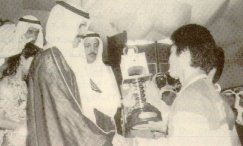 The powerful attacks of Ricardo Vante Rodriguez (best spiker) and Roberto
Sotolongo were not enough to take Cuba to the top level of the awards
podium. The young men led by Josd Antonio Rojas (best coach) had to be
content with the silver medal.
The powerful attacks of Ricardo Vante Rodriguez (best spiker) and Roberto
Sotolongo were not enough to take Cuba to the top level of the awards
podium. The young men led by Josd Antonio Rojas (best coach) had to be
content with the silver medal.
Gold goes to the Republic of Korea
The Korea's made the most of the characteristics of their playing style; and,
taking advantage of fine receiving by his team mates, director Lee Sung Hee
(named best passer in the tournament) was able to distribute attack schemes
in the most effective manner possible. The fast combinations concluded
masterfully by Kim Eun Suk (best player) and Seo Nam Won (a protagonist
in '85 too) brought the team to the final phase of the tournament with only
one match having been lost - the match with the Federal Republic of
Germany, which proved to have no influence on the final standings.
And so the young Asians reached the semifinals against the outgoing
champions from the USSR and won that match 3- 1. It was an exciting and
hard-fought contest that kept the spectators who had crowded the Juffair
Dome holding their breath, especially in the first and last games, won by the
Korea's 16~14 and 18-16 respectively.
The match to decide the gold pitted the Republic of Korea against Cuba, which had been victorious in the semifinals against the Federal Republic of Germany. An enormous crowd thronged the Juffair Dome; indeed, hundreds of would be spectators were turned away because tickets were sold out.
The match was very exciting and studded with sudden and unexpected
surprises. The Korea's and Cubans played an extremely high level
volleyball, with the match going to the fifth game. In the end, the tactical
maturity of the young Asians took command, and the Republic of Korea
accepted the long sought trophy from the hands of Prince Shaikh Hamad Bin
Isa Al Khalifa.
 The powerful attacks of Ricardo Vante Rodriguez (best spiker) and Roberto
Sotolongo were not enough to take Cuba to the top level of the awards
podium. The young men led by Josd Antonio Rojas (best coach) had to be
content with the silver medal.
The powerful attacks of Ricardo Vante Rodriguez (best spiker) and Roberto
Sotolongo were not enough to take Cuba to the top level of the awards
podium. The young men led by Josd Antonio Rojas (best coach) had to be
content with the silver medal.
In third place were the Soviets. The USSR, which had beat 3-1 the Federal Republic of Germany, which was the real revelation of this event, didn't succeed in its attempt to win a fourth consecutive gold medal. There was therefore a certain disappointment for the outgoing champions, who nevertheless, supported by Vladimir Goudima (best blocker) who was unstoppable in first line, didn't fail to take a medal.
Bulgaria racked fifth. This Eastern European team, last year's continental champions, won over Brazil 3-1 thanks to the splendid performance of athletes such as Kaydenov, Todorov, and Kovatchev, all of whom are already regulars on the senior national team.
Argentina placed seventh - a result that was decidedly an improvement over
its eleventh place of '85, but certainly not up to the expectations of this
South American team, which could count as assets several players of
international calibre, such as Esteban De Palma (best service), who put his
adversaries' reception to a great test with his formidable jumping serves.
There was considerable satisfaction for Bahrain, which in placing eighth,
obtained the best result of all times for an Arab team. With constant support
from an enthusiastic public, the home team showed significant technical and
tactical improvement, especially in back line basic skills. Indeed, the
national favorite, Adbulla Saad, was named best defensive player.
In addition, this result rewards - at least in part - this Gulf nation for its
commitment and hard work in guaranteeing that everything at this event
could proceed in fine order. Presided over by Shaikh Isa bin Mohammed
AI-Khalifa, the Organising Committee did a really top-notch job, meriting
praise from FIVB President Ruben Acosta in his concluding remarks.
Confirming the momentary crisis of talent in the men's field in China and
Japan, these two countries placed ninth and tenth respectively. Greece and
Canada faced each other to decide on the eleventh spot. The European team,
led by Georgos Dragovits, a very promising young man already part, of the
senior team, topped its adversaries 3-0.
The consolation round for 13th to 16th place was played between Egypt, Saudi Arabia, Algeria, and Peru. In the final standings, Egypt came out ahead by only one game over Algeria (14th); while Saudi Arabia, heavily penalized by player stature, and Peru placed fifteenth and sixteenth respectively.
At the close of competition, FIVB President Ruben Acosta announced that the next edition of the tournament will be held in 1989 in Greece - a new setting for this event, which has now established itself as one of fundamental importance for the growth of world volleyball.
New interpretation
During the Junior World Championship tournament played in Bahrain, a
new idea was introduced to eliminate drying of the floor during games. This
operation, necessary when a perspired athlete dives for a defensive save, was
permitted only during times-out or at the end of each game. Provisions were
also adopted (loss of a point or of service) to penalize a player or a team that
requested drying of the floor with the obvious intention of interrupting the
continuity of the match.
